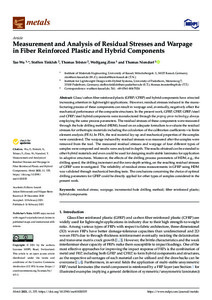| dc.date.accessioned | 2021-03-05T14:11:42Z | |
| dc.date.available | 2021-03-05T14:11:42Z | |
| dc.date.issued | 2021-02-16 | |
| dc.identifier | doi:10.17170/kobra-202103053432 | |
| dc.identifier.uri | http://hdl.handle.net/123456789/12592 | |
| dc.description.sponsorship | Gefördert durch den Publikationsfonds der Universität Kassel | |
| dc.language.iso | eng | |
| dc.rights | Namensnennung 4.0 International | * |
| dc.rights.uri | http://creativecommons.org/licenses/by/4.0/ | * |
| dc.subject | residual stress | eng |
| dc.subject | warpage | eng |
| dc.subject | incremental hole drilling method | eng |
| dc.subject | fiber reinforced plastic | eng |
| dc.subject.ddc | 620 | |
| dc.subject.ddc | 660 | |
| dc.title | Measurement and analysis of residual stresses and warpage in fiber reinforced plastic and hybrid components | eng |
| dc.type | Aufsatz | |
| dcterms.abstract | Glass/carbon fiber reinforced plastic (GFRP/CFRP) and hybrid components have attracted increasing attention in lightweight applications. However, residual stresses induced in the manufacturing process of these components can result in warpage and, eventually, negatively affect the mechanical performance of the composite structures. In the present work, GFRP, CFRP, GFRP/steel and CFRP/steel hybrid components were manufactured through the prepreg-press-technology always employing the same process parameters. The residual stresses of these components were measured through the hole drilling method (HDM), based on an adequate formalism to evaluate the residual stresses for orthotropic materials including the calculation of the calibration coefficients via finite element analysis (FEA). In FEA, the real material lay-up and mechanical properties of the samples were considered. The warpage induced by residual stresses was measured after the samples were
removed from the tool. The measured residual stresses and warpage of four different types of samples were compared and results were analyzed in depth. The results obtained can be extended to other hybrid materials and even could be used for designing multi-stable laminates for application in adaptive structures. Moreover, the effects of the drilling process parameters of HDM, e.g., the drilling speed, the drilling increment and the zero-depth setting, on the resulting residual stresses of GFRP were investigated. The reliability of residual stress measurements in GFRP using HDM was validated through mechanical bending tests. The conclusions concerning the choice of optimal
drilling parameters for GFRP could be directly applied for other types of samples considered in the present work. | eng |
| dcterms.accessRights | open access | |
| dcterms.creator | Wu, Tao | |
| dcterms.creator | Tinkloh, Steffen Rainer | |
| dcterms.creator | Tröster, Thomas | |
| dcterms.creator | Zinn, Wolfgang | |
| dcterms.creator | Niendorf, Thomas | |
| dcterms.extent | 23 Seiten | |
| dc.relation.doi | doi:10.3390/met11020335 | |
| dc.subject.swd | Faserverstärkter Kunststoff | ger |
| dc.subject.swd | Hybridwerkstoff | ger |
| dc.subject.swd | Verzug | ger |
| dc.subject.swd | Eigenspannung | ger |
| dc.type.version | publishedVersion | |
| dcterms.source.identifier | EISSN 2075-4701 | |
| dcterms.source.issue | Issue 2 | |
| dcterms.source.journal | Metals | eng |
| dcterms.source.volume | Volume 11 | |
| kup.iskup | false | |
| dcterms.source.articlenumber | 335 | |


